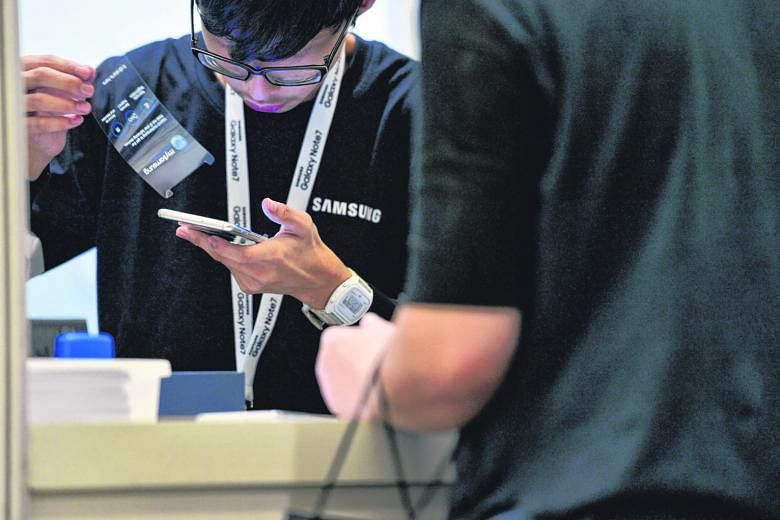Who would have thought the innocuous mobile phone could be responsible for so many firsts and sector-rattling headlines this year?
Indeed, the ease of accessing anything - information as well as malware - from the Web has cut both ways for the Singapore Government, and is the biggest impetus behind its radical move to ban Web-enabled devices from connecting to government systems.
The aim is to create an "air gap" between the Web and the Government's internal systems so malware will not find its way in, spread and bring down critical systems. This also means that highly classified work e-mails or files will not find their way onto unsecured Internet devices.
After The Straits Times' report hit the streets in June, a heated online debate ensued, with keen interest shown by international media.
The move is particularly striking in its breadth. It will affect 143,000 public servants - except teachers, as they are plugged into a separate internal network - by May next year.

They will need to surf the Web on separately issued laptops, computers and tablets, or on their personal mobile phones. Work laptops that are plugged into the Government's internal e-mail and file servers will have no Internet access.
In adopting such a sweeping policy, Singapore is outdone only by Russia, whose intelligence services in 2013 went back to using manual typewriters to thwart alleged spying by the United States.
The German government had also reportedly said it was considering going back to typewriters and ditching e-mails completely for the same reason.
The suggestion was met with strong opposition from parliamentary committee members, who called it "absurd".
But while some may question the need for such drastic measures, it is, at least in Singapore's case, necessary, said Singapore's Cyber Security Agency chief executive David Koh.
There were limitations in even the latest technologies against new threats. Already, 16 attacks against the Singapore Government's networks over the past year made it past firewall systems provided by vendors. The malware was eventually detected and extracted with no damage done.
In 2014, there was a security breach of the Ministry of Foreign Affairs' IT system. Steps were taken to isolate the affected devices, and the networks were strengthened following the discovery.
There was also a series of attacks in 2009 in the run-up to the Asia- Pacific Economic Cooperation meetings held in Singapore, targeting the organising committee members and delegates.
Prime Minister Lee Hsien Loong painted the most dire outcome if the Government had not taken such a step. "Otherwise, one day you find all your NRIC numbers, addresses and income tax returns for sale on the Internet... how will the Government explain?"
FOURTH TELCO
If mobile phones proved to be a disruption this year, then surely the same would be felt in the mobile sector itself.
This is especially so after industry regulator Infocomm Media Development Authority (IMDA) put premium airwaves on the auction block - with a 45 per cent discount on their reserve price - to entice a new player to enter Singapore's mobile-phone market.
The move made headlines as the discount was unprecedented. It was also met with strong objections from Singtel, StarHub and M1.
But IMDA stuck to its guns, desperate to see innovation that would benefit consumers. This paved the way for three companies, including dark-horse Australian telco TPG Telecom, to sign up for the 4G airwave auction in September.
Three-month-old local start-up airYotta was later disqualified, resulting in a two-horse race between TPG and local fibre broadband operator MyRepublic.
Two weeks ago, TPG was named as Singapore's fourth telco with its winning bid of $105 million - breaking a triopoly of 16 years held by Singtel, StarHub and M1.
More changes are afoot as TPG competes with the three telcos for engineering talent to roll out its 4G network to meet IMDA's requirement of nationwide services by September 2018.
SAMSUNG NOTE7
To cap off the disruptive mobile year, the Samsung Note7 had the unenviable distinction of being the phone behind the largest recall in mobile history.
Globally, 2.5 million units were recalled, with tens of thousands affected in Singapore.
The world's largest smartphone maker discontinued the global production and sale of its flagship Note7 device in October, just two months after the phone's launch.
The move follows several reports of the phone emitting smoke or catching fire in the US, South Korea and Australia. The global recall was estimated to have cost the company US$18 billion (S$26 billion), according to Bloomberg.
Samsung had wanted the Note7 to be its best phone - slim and sleek, yet packed with the most advanced features and a long battery life. It received rave reviews until the phone caught fire due to what was initially a battery fault. The root cause is still unknown.
The Note7 even made it to the list of banned items on board all flights.


